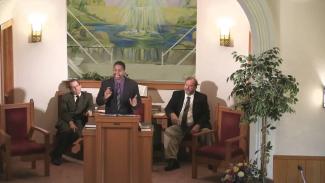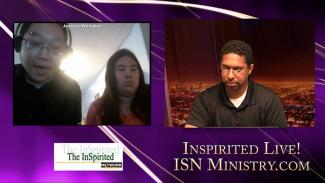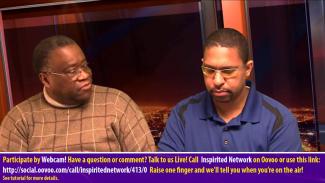Dr. Andy Nash joins us this week as we study the beginning of the ministry of Jesus. Why was Jesus led into the wilderness? How did Jesus fulfill prophecy as He went to different places during His ministry? What did Jesus' life reveal about the character of God in contrast to the character of Satan? What message did both Jesus and John the baptist preach, and how would that compare with the message that the world needs to hear today? How can we gain comfort and encouragement looking at the early days of Jesus' ministry according to the gospel of Matthew?
Topic: Love
To see more broadcasts select show names, a year, or all video media.This week we start a new series on rebellion and redemption. Why is the world as messed up as it is today? Are the corruption, disease, pollution, and problems we observe part of God's design? What went wrong in the Garden of Eden? Is God to blame for Adam and Eve's mistake? Why did the tree of the knowledge of good and evil exist? Was mankind set up to fail? Why was humanity given power to choose? How does all this tie in with the Great Controversy and with our lives today?
What was the mission and message of Paul all about? What could we say was central to his message? What did Paul preach? How did he adapt his message to reach different kinds of audiences? How important was the concept of the resurrection in Paul's teaching? In this lesson we will explore the techniques Paul used to reach Jewish and Gentile audiences. Like Jesus, Paul used what was familiar to his listeners to explain what was unfamiliar to them. In looking at how Paul did this, we can learn a great deal about teaching spiritual truths to people today.
What was the mission of Jesus? How is that mission expressed in His parables? What do we learn in the parables about how God views the lost? How do these stories demonstrate the character and love of God? This week as we study the book of Luke, we explore some of the parables as we look at Luke's understanding of Jesus' mission. We will look at the parable of the lost sheep, lost coin, prodigal son, rich man and Lazarus, and the servants entrusted with talents.
What does Proverbs say about humility and pride? What wisdom is there in being humble? This particular set of proverbs was contributed by Agur, who scholars know very limited information about. What wisdom does Agur have for family relationships? How should children relate to their parents when they get old? In what ways do the words used in these Proverbs connect with God's discussion with Job? What statements are made about God as Creator?
What words of Wisdom does Proverbs contain for every day life? What implications are there for how we should treat others? While the Bible teaches that we should give to those in need, what does it say about those who don't have because they refuse to work? What practical advise does Proverbs have for parents and how they discipline their children? This week we focus on Proverbs 20 to 22.
What does Proverbs teach about relationships? How should people deal with conflicts with one another? How do words play a role in conflicts? If friends are to love one another, what does that love look like and how should it be demonstrated? What value should be placed on money in our personal relationships? This week, in Proverbs 17-19, Solomon explores conflicts and gives sound wisdom that can greatly impact how we get along with one another.
What does the book of James teach about how we use our mouths? James seems to suggest that though the mouth is a small part of our body, it has a great influence. What spiritual implications might this hold for Christian believers today? How do our words impact one another? Is it OK for Christians to use foul language, even when talking with those who use it frequently? How can we do better at using our speech in more meaningful and edifying ways? Why is it so important that we be mindful of the things we say?
What is the relationship between faith and works? Should our faith motivate us to do works? Is it possible to have faith and take no action on it? Was there a difference between what Paul said about faith and works in comparison to James? What does it mean to have true faith? This week we continue our study of the book of James looking at faith that works.
James had a lot to say about love and law. He corrects the church, rebuking the partiality and favoritism of the wealthy while many neglected the poor. James discusses how partiality transgresses the law of love. But how? Is there more to the law than we understand at surface value? Does the fairness with which we treat each other impact our keeping of God's Commandments? Can a person keep the Commandments yet not care for the poor? Can one be a Commandment keeper and be wealthy? What does love have to do with God's Law and justice. We explore these topics this week.
Jesus prayed for the church to be united, but what were the grounds for that unity? What were the unifying factors of God's church? How can we put unity into practice? What or whom did Jesus say was the foundation of the church? What rock is it founded upon and how can we be sure? When conflict arises amongst brethren, what steps can we take toward conflict resolution?












